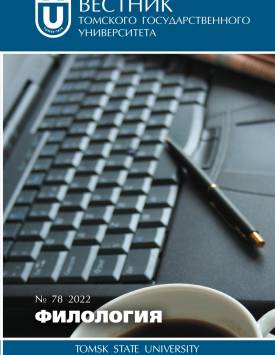First experiences of the French reception of Russian literature: Works of Antiochus Cantemir
The perception of literary works by representatives of different cultures is an integral part of intercultural communication. This article is aimed at revealing the particularities of the French reception of the first literary texts of Russian literature which became available to the French reader of the 18th century, namely of the works of Antiochus Cantemir. The materials for the research were the French- and Russian-language sources, some of which are for the first time introduced into the scholarly discourse of Russian literary criticism. The article starts with an examination of Cantemir’s personality - a diplomat, poet-satirist, translator, and simply a very educated person - and its possible influence on the perception of his works by French recipients. Further, in chronological order, the reaction of the French public to the publication of Cantemir’s works is examined. The period under study is limited to the 18th century. The most significant reaction from the French public was awarded to the Cantemir’s eight satires - the first works of fiction translated into French and published in 1749, thirteen years before the first publication of the satires in Russia. Of particular value, both for the French reader and for understanding the specifics of the reception, is the translator’s 150-page introduction to the edition of the satires. This introduction emphasizes among other things the importance of the personal factor in the fate of the writer’s creations. It also introduces the statement which later becomes widespread: “Cantemir is the founder of the Parnassus of Russia”. In the mid-1750s, France begins to get acquainted with other Russian authors. It is noteworthy to mention here the first perception of Sumarokov by French criticism (in 1755 a French translation of the tragedy Sinave and Truvor was published), which is different in tone from the perception of Cantemir. Accusations of Russian authors of imitations, widespread in the 19th century, trace their history precisely from Sumarokov. Despite the small number of the first facts and little evidence of the perception of Cantemir’s works in France, which have come down to us, one can nevertheless note some favor of the French public for his works, in comparison, for example, with the first reaction of the French to Sinave and Truvor by Sumarokov or, a century later, to Dead Souls by Gogol. The favor is explained, in my opinion, on the one hand, by a certain circumspection that often appears when meeting something for the first time (more precisely, by the fear of not evaluating something really outstanding), the first acquaintance with secular literature unknown to them in this case, and, on the other hand, by the personality of Cantemir himself. The time for literary analyses had not yet come, the assessments were of a general nature, Cantemir was being established in France as the “Founder of the Parnassus of Russia”. The author declares no conflicts of interests.
Keywords
Cantemir, Russian literature, reception, intercultural communication, French translationsAuthors
| Name | Organization | |
| Zavgorodnii Aleksei M. | Moscow Pedagogical State University | almzav@yandex.ru |
References

First experiences of the French reception of Russian literature: Works of Antiochus Cantemir | Vestnik Tomskogo gosudarstvennogo universiteta. Filologiya – Tomsk State University Journal of Philology. 2022. № 78. DOI: 10.17223/19986645/78/7
